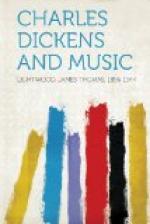As Smike and Nicholas tramp their long journey to Portsmouth they hear the sheep-bells tinkling on the downs. To Tom Pinch journeying Londonwards ’the brass work on the harness was a complete orchestra of little bells.’
What a terror the bells are to Jonas Chuzzlewit just before he starts on his evil journey! He hears
the ringers practising in a neighbouring church, and the clashing of their bells was almost maddening. Curse the clamouring bells! they seemed to know that he was listening at the door, and to proclaim it in a crowd of voices to all the town! Would they never be still? They ceased at last, and then the silence was so new and terrible that it seemed the prelude to some dreadful noise.
The boom of the bell is associated with many of the villains of the novels. Fagin hears it when under sentence of death. Blackpool and Carker hear the accusing bells when in the midst of planning their evil deeds.
We can read the characters of some by the way they ring a bell. The important little Mr. Bailey, when he goes to see his friend Poll Sweedlepipe (M.C.) ’came in at the door with a lunge, to get as much sound out of the bell as possible,’ while Bob Sawyer gives a pull as if he would bring it up by the roots. Mr. Clennam pulls the rope with a hasty jerk, and Mr. Watkins Tottle with a faltering jerk, while Tom Pinch gives a gentle pull. And how angry Mr. Mantalini is with Newman Noggs because he keeps him
’ringing at this confounded old cracked tea-kettle of a bell, every tinkle of which is enough to throw a strong man into convulsions, upon my life and soul,—oh demmit.’
The introduction of electric bells has been a great trial to those who used to vent their wrath on the wire-pulled article or the earlier bell-rope, which used not infrequently to add unnecessary fuel by coming incontinently down on the head of the aggrieved one. What a pull the fierce gentleman must have given whose acquaintance Mr. Pickwick made when he was going to Bath! He had been kept waiting for his buttered toast, so he (Captain Dowler)
rang the bell with great violence,
and told the waiter
he’d better bring the
toast in five seconds, or he’d
know the reason why.
Dickens rang far more changes on the bells than there is space to enumerate; but I have shown to what extent he makes their sound a commentary on innumerable phases of life. A slight technical knowledge of bell phraseology is found in Barnaby Rudge (7), where he mentions the variations known as a ‘triple bob major.’ Finally there is an interesting reference in Master Humphrey’s Clock to a use of the bell which has now passed into history. Belinda says in a postscript to a letter to Master Humphrey, ’The bellman, rendered impatient by delay, is ringing dreadfully in the passage’; while in a second PS. she says, ’I open this to say the bellman is gone, and that you must not expect it till the next post.’




